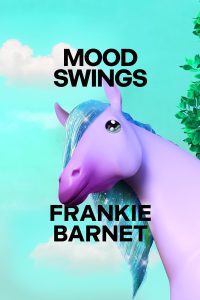Ian Mond Reviews Mood Swings by Frankie Barnet
 Mood Swings, Frankie Barnet (Astra House, 978-1-66260-259-7, $26.00, 304pp, hc) May 2024.
Mood Swings, Frankie Barnet (Astra House, 978-1-66260-259-7, $26.00, 304pp, hc) May 2024.
The Ministry of Time wears its time travel on its literary sleeve. Frankie Barnet’s debut novel, Mood Swings, isn’t nearly as overt. In fact, it begins with the world in lockdown – not because of the pandemic (though I did get flashbacks) but because animals have turned on humanity. “Wasps targeted small children and the elderly; dogs bit off toes; a woman in Longueuil had her eyes torn out by a rabbit… a man’s parakeet pecked apart his grandson’s cheek.” The solution? A sonic signal, funded by Californian billionaire Roderick Maeve, that wipes out every single animal. Even the insects. It’s an action that, in the short-term, frees people from their houses but, in the medium term, adds a further nail in the planet’s coffin (most notably the essential role animals and insects play in agriculture and food production). Solution? A Time Machine, again funded by Roderick Maeve, that will allow history to be tweaked and optimised so everything can return to normal.
Against this pre-apocalyptic backdrop, we encounter best friends Jenlena and Daphne, your typical middle-class humanities graduates living in Montreal. Both aspire to be writers, we even get snippets of Jenlena’s poetry – but the end of the world has put a cork in their creative pursuits. Daphne is fired from her job in dramatic circumstances (an air-fryer she abruptly throws out the office window breaks a woman’s toe) and, falling into a pit of depression, shacks up with her “cancelled” ex-boyfriend, Jordan. Jenlena, on the other hand, spends her weekends dressed as a dog, meeting her clients in a hotel room where, for a brief moment, they feel loved. “It didn’t matter what you looked like or how work was going, an animal was a creature who loved you outside of culture.” It’s while leaving a hotel after a session with a client that Jenlena bumps into Roderick Maeve. He’s immediately fascinated and then obsessed with Jenlena, this “normal girl” with the “energy of a knapsack.” Jenlena is happy to go along for the ride – even if a jealous Daphne thinks that Maeve will eventually discard her – just to enjoy a taste, no matter how fleeting, of absolute power and wealth.
Chuck Palahniuk’s Fight Club frequently came to mind as I read Mood Swings. To be clear, they are tonally and structurally different – you won’t find Palahniuk’s short, sharp, aphoristic prose or the infamous twist – but they resonate on the topic of alienation, on their portrayal of a generation made numb by billionaires and governments in thrall to capitalism and their own self-destruction. In Fight Club, Project Mayhem, led by Tyler Durdin, seeks to burn everything down. In Mood Swings, the cultish Moon Bethlehem, young people who have turned away from society, preach for the end of the world. In both cases, the satire is savage and discomfiting.
Where Fight Club and Mood Swings differ is on the question of who is being alienated. For Palahniuk, it’s exclusively men (primarily working class, led by a white-collar office worker). For Barnett, it’s everyone. Whether it’s Jenlena’s clients who are willing to pretend that she is their dog just to feel something other than empty, or the Moon Bethlehem’s, as represented by social media influencer “Moon” Cicero, who think it’s “just cruel to keep humanity going.” Even Roderick Maeve is lost. He believes he’s saving the planet by building a time machine but, by his admission, is entirely detached from “normal” people. Of all the characters, he’s the one I found the most fascinating, mainly because he isn’t a dull, thin analogue of Elon Musk. Yes, he’s pure ego, vapid and arrogant, surrounded by models and factotums, but he has a vulnerability that makes him almost human.
For a novel that doesn’t feature a single paradox, time loop, or change to history, Mood Swings offers up an incisive critique of time-travel narratives. It’s not just the absurd plan, conjured up by a multinational, to introduce solar technology to the Industrial Revolution (“it would pretty much solve the weather crisis”); it’s also the vox pops that are peppered through the narrative where people are asked what they would do if they could go back in time. Several of the replies are what you’d expect – kill Hitler or win the lottery – but more often than not, the responses are reflective, melancholy, poignant. The father who wants to make it right with his children, the daughter who will force her dad to check himself for cancer, and the employee who would take their work seriously and would show their bosses they’re worth the investment. But as we read these answers, each tinged with desperation, regret, and sadness, we know that there’s no going back, no fixing our mistakes, that our failures as individuals and a species are ours to own. That’s the key message I took from this darkly satirical novel. It’s a difficult truth to swallow, but one that’s growing increasingly harder to ignore.
Ian Mond loves to talk about books. For eight years he co-hosted a book podcast, The Writer and the Critic, with Kirstyn McDermott. Recently he has revived his blog, The Hysterical Hamster, and is again posting mostly vulgar reviews on an eclectic range of literary and genre novels. You can also follow Ian on Twitter (@Mondyboy) or contact him at mondyboy74@gmail.com.
This review and more like it in the May 2024 issue of Locus.
 While you are here, please take a moment to support Locus with a one-time or recurring donation. We rely on reader donations to keep the magazine and site going, and would like to keep the site paywall free, but WE NEED YOUR FINANCIAL SUPPORT to continue quality coverage of the science fiction and fantasy field.
While you are here, please take a moment to support Locus with a one-time or recurring donation. We rely on reader donations to keep the magazine and site going, and would like to keep the site paywall free, but WE NEED YOUR FINANCIAL SUPPORT to continue quality coverage of the science fiction and fantasy field.
©Locus Magazine. Copyrighted material may not be republished without permission of LSFF.






